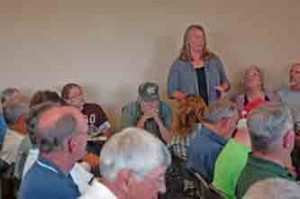Groundwater Ordinance Supported
- Share
- Tweet
- Pin
- Share

Nancy Utesch of the Town of Pierce in Kewaunee County testifies at the public hearing on a proposed groundwater ordinance that would ban the spreading of liquid manure on rural land having less than 20 feet in soil depth to carbonate bedrock from Jan. 1 through April 15. The packed hearing was held before the Kewaunee County Land and Water Conservation Committee at the county fairgrounds in Luxemburg.
Joe Musial of the Town of Lincoln summed up the tenor of the Sept. 9 public hearing held on Kewaunee County’s proposed groundwater ordinance: “We cannot have business at any cost. Common sense should prevail.”
In fact, not a single word was uttered against the proposed ordinance at the standing-room-only hearing held at the county’s fairgrounds in Luxemburg, even though the ordinance is aimed at the county’s chief industry – dairy farms. The ordinance would ban the spreading of manure on rural land with thin topsoil (20 feet to bedrock) from Jan. 1 to April 15.
“This is an idea whose time has come,” said Pat Schoenbeck, the first of 23 people who offered comments on the ordinance. She also praised the ordinance for returning local control to the communities. If the Kewaunee County Board approves the ordinance at its Sept. 23 meeting, it will then go to referendum in each of the county’s municipalities.
Other speakers talked about getting sick from tainted well water and being unable to use their water.
“Water quality should be first and foremost,” said Jesse Jerabek of the Town of Lincoln, who added that it might be tough to do the right thing when it goes against the county’s biggest industry, but there will be no jobs in 20 years if the county’s water quality continues to deteriorate.
“To me the incentive to do the right thing is our kids. They are the future and legacy of our towns,” he said.
Mick Sagrillo, chair of the Plan Commission for the Town of Lincoln, which has a very high concentration of contaminated wells, noted that USDA microbiologist Mark Borchardt referred to the water quality in the town equivalent to that of “a third world country.”
Dick Swanson of Algoma warned that another 20,000 cows are coming to the county, in addition to the 76,000 to 80,000 cows in the county now (and only 20,624 people).
“Those 100,000 cows will produce 4.2 million tons of manure. Tons!” he said. “I don’t think there’s enough land in Kewaunee County to support the cows we have now, let alone what’s coming.”
“I just want water I can drink,” said Susan Daly, who farms 80 acres in Red River.
Dale Goodner of Algoma said he supports the ordinance as a foot in the door. He said 50 years ago he was working on trout stream habitat improvement in Kewaunee County.
“Imagine that. The water was clear as a bell,” he said. “We were picturing Kewaunee County in the year 2000 as a mecca for fly fishing. It was a dream.”
Then he took a job out of state for 35 years. “I’m Rip Van Winkle. I know what it was. I came back and looked around and frankly, I was appalled. I’ve been out taking pictures of water, creeks and streams. I can’t find clean water all summer long. It’s really changed…This is not the norm, you guys. This is weird.”
Perhaps the most potent testimony came from Judy Treml, whose family well was contaminated by e-coli in 2004, at a level 100 times higher than it takes for the county to close a beach. The contamination happened four days after manure was spread on a field across the street.
She quickly learned that no one was willing to accept responsibility for the contamination. The Department of Natural Resources, the regulatory agency for manure spreading, sent her to the county health department, which told her to shut the water off and move her three young children.
The Tremls filed a lawsuit and won a court order against the CAFO operator. The order prevented manure spreading in the winter when the groundwater is recharging, which led to a clean bill of health for the family’s well.
She suggested the hundreds of millions of gallons of liquid manure spread on Kewaunee County farmland amounts to a “hazardous waste dump” rather than nutrient management planning.
“A lobbyist for the DBA (Dairy Business Association) questions whether this ordinance was based on sound science,” Treml said. “I have to wonder, 10 years later, what exactly would the DBA consider sound science to be?”
Nancy Utesch of the Town of Pierce said she and her husband are beef farmers. “As a beef farmer, I am going to tell you today, you can live without beef, and you can live without cheese and you can live without dairy. One thing no one in this room can live without is water,” she said. “As a farmer here today, we need to protect this resource and we need to start caring about neighbors again. I am not going to produce a product that poisons our neighbor…there needs to be a level of moral responsibility brought back into this argument.”

